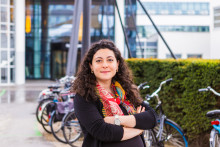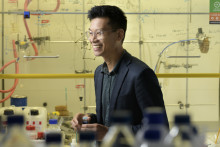Pieter Langerhuizen Lambertuszoon Fonds
A grant from the Pieter Langerhuizen Lambertuszoon Fonds is annually awarded by the Royal Holland Society of Sciences and Humanities (Koninklijke Hollandsche Maatschappij der Wetenschappen). The financial support is provided to only one researcher every year. Until this year, it consisted of €15.000, but as of 2019 the support has the total worth of €25.000.
‘In Europe, only about 50% of chronic disease patients take their medicine as prescribed by the doctor,’ says Gümüscü, a researcher at the Mesoscale Chemical Systems group of the UT. ‘Patients often stop taking pills due to side effects, or because they forget or decide to switch to different ones. However, they don’t communicate this to their doctor, even though the doctor needs to be kept informed. If the treatment fails, how is the doctor to know if it was due to the therapy or the patient not taking pills?’
‘To address this problem, I will develop a platform that cannot be tricked like the existing ones on the market,’ continues the scientist. ‘When drugs are administered and processed, the body produces specific metabolites. These products end up in our bodily fluids such as urine, saliva, and sweat. We can detect the presence and concentration of these products in the bodily fluids using a combination of chemistry and microfluidics, and therefore check if the patient took the pills or not.’
'There is no way to fake it'
Gümüscü is developing a small sensing device capable of precisely that. She plans to use functionalized hydrogel that changes colour depending on the level of concentration of the medicine’s end products. This handheld device will have multiple hydrogel units, so that the doctor can check for different metabolites from one patient sample. ‘There is no way to fake it and the results will be shown instantly. If the hydrogel changes its colour, it means the patient took the medicine.’
Design of the sensing device
The UT scientist is able to work on this sensing device thanks to the Pieter Langerhuizen Lambertuszoon grant. ‘There is smart chemistry behind this sensing platform, which is not only limited to analysis of medicine non-adherence. In the future, I will explore if this technology can be further used for drug checking and pill testing for amphetamine-type stimulants, or for monitoring pills for psychotropic medication substrates. As an early career scientist, I appreciate the Pieter Langerhuizen funding because it provides with a good start to my longer-term goals. I’m trying to build my own research line here and I want to run exciting projects here at UT. This feeds my excitement for my work.’








